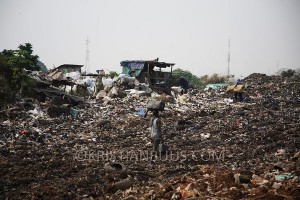The Lagos State Government has embarked on a venture aimed at turning the unenviable condition of its solid waste generation into a blessing. The nation’s commercial nerve centre has been having a running battle with managing the huge turnout of its domestic waste, giving it the infamous tag of being one of the filthiest cities on the planet.

It appears that, all along, the overpopulated state sat on a goldmine, but the authorities have apparently come to the realisation of this fact.
Courtesy of a Landfill Gas Recovery and Utilisation Project (LGRUP), government will soon begin to produce gas from the heaps of refuse dotting the metropolis, thereby generating direly-needed revenue and serving sundry purposes.
Decades of groping in dark have given way to a positive turnaround, typified to the overhaul of the Lagos Waste Management Authority (LAWMA) and the adoption of private sector participation (PSP) under an Integrated Solid Waste Management (ISWM) endeavour.
The project, which is being executed by LAWMA in partnership with the United Nations Environment Programme (UNEP) and the African Carbon Asset Development (ACAD), is meant to capture methane gas generated from waste, utilise it for electricity, prevent the release of greenhouse gasses (GHGs) into the atmosphere, curb country’s carbon footprint and ensure compliance with international standards on environmental governance.
The LGRUP is a component of the ISWM project, which is a PSP initiative, whereby government will execute a 20-year concession agreement with the private sector.
Among other benefits, the LGRUP is meant to bequeath better environmental health and living standard; ensure job creation and investment opportunities; provide public utility and infrastructure through public-private partnership; wealth creation and market-based solution for waste.
The ISWM is for the closure, collection and utilisation of landfill gas at the existing dumpsites; and the establishment of an integrated solid waste management facility comprising of a material recovery facility, recycling and composting facility as well as sanitary landfill for residual use.
The objectives of the project are to fully harness and utilise alternative options available in managing waste, thus reducing reliance on landfill disposal as well as minimise the emission of greenhouse gases, while managing waste in an environmentally sound, socially responsible and financially sustainable manner.
LAWMA is in the process of implementing the second phase of the project under a consultancy contract. The first phase, which comprises pre-engineering design, commenced in February 2011 and should be completed within 12 to 18 months.
Starting with the Olusosun landfill site in Ojota, the project will also be extended to the Abule-Egba and Solous landfill sites.
Managing Director of LAWMA, Ola Oresanya, said, “At the Olusosun landfill, we have developed gas wells to manage and recycle municipal solid waste into clean energy. Landfill gas can be generated 24 hours per day, seven days a week.
“Landfill gas is extracted from landfills using a series of wells and a blower or vacuum system. This system directs the collected gas to a central point where it can be processed and treated depending on the ultimate use for it.
“Landfill gas-to-energy projects do not only mean deceasing the hazards towards our climate; they also serve as a substitute for fossil fuels, such as natural gas. Landfill gas can be extracted for a variety of energy purposes, such as generation of electricity with engines, turbines, micro turbines and other emerging technologies,” he added.
Landfill gas, according to Oresanya, is produced through biodegradation, volatilisation and chemical reactions, noting that the more organic waste present in a landfill, the more landfill gas is produced by bacteria during composition.
Apart from the landfill sites, he said electricity would be generated from the 1,000 tonnes of waste daily processed at the Simpson Transfer Loading Station for the benefit of poor communities around the station and to illuminate the Third Mainland Bridge.
Oresanya disclosed that the state was planning to establish 20 new landfill sites to replace the existing six, with work already started on the one in Epe, while the one in Badagry, which will be the biggest in Africa, would soon commence.
The LAWMA boss said that the gas recovery project had already commenced in Olusosun and would gradually be extended to other landfills once the arrangement had been firmed up with the private sector investors.
Other waste-to-wealth projects being facilitated by LAWMA, according to Oresanya, include the nylon buyback programme, recycling banks, recycling plant at the Olusosun recycling centre; collection of PET, aluminium cans, cardboard, cullet and other materials; and compost facility in Ikorodu in collaboration with Messrs Earthcare.
Others are the establishment of the recycling village for waste to wealth; engagement in school advocacy programme; waste paper collection; attracting investors for recycling, compost, tyre and waste to energy projects among others; collection and disposal of garden waste; and collection of broken bottles or cullet.
General Manager, Technical Services, LAWMA, Jeleel Olubori, described the LGRUP as being part of the process for developing and registering a Clean Development Mechanism (CDM) project under the Kyoto Protocol managed by the United Nations Framework Convention on Climate Change (UNFCCC).
“The recovery of landfill gas from the authority’s landfill sites, though coming at the end of the first Kyoto emission regime, should be commended, considering the environmental incidents witnessed within the last 12 months in the state and other parts of the country,” he said.
